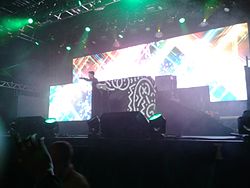| UKA | |
|---|---|
 | |
| Dates | Biennially in October |
| Location(s) | Trondheim, Norway |
| Years active | 1917 – present |
| Website | UKA.no |
UKA is the largest cultural festival in Norway and is held biannually by volunteer students from Trondheim. In 2019, the festival is set to be held for the 50th time. In 2015, 1700 students did volunteer work, while 90,000 event tickets were sold. [1] The name "UKA" translates to "the week", although it now lasts for the better part of a month, with events including concerts, theatre, seminars and more.

